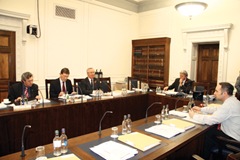Protect the front-line: Jim Wells
 Jim Wells, who chairs the Assembly’s Health, Social Services and Public Safety Committee, sets out its priorities and concerns as the budget approaches.
Jim Wells, who chairs the Assembly’s Health, Social Services and Public Safety Committee, sets out its priorities and concerns as the budget approaches.
In the current climate of belt-tightening and competing claims on the Northern Ireland budget, we are all striving to ensure that we deliver the services we need and obtain value for money.
My committee plays an important part in ensuring that the Health Minister and his department provide the services required and introduce efficiencies by holding him to account and vigorously reviewing his policies and priorities.
The Department of Health accounts for approximately 40 per cent of the total Northern Ireland budget; the Belfast Trust alone employs some 22,000 people, spending £930 million in this year alone.
And while it is welcome news that the health component of the overall budget is likely to be protected, it is clear that the Health Service will be under severe strain over the coming years. Capital spending will be hit hard: the monies available to Northern Ireland as a whole will be cut by 40 per cent by 2014-2015 compared to the level available for 2010-2011.
A number of issues are, therefore, at the top of my committee’s agenda.
First and foremost we believe that the department’s focus must be on protecting front-line services for patients. This is, of course, a complex issue; preserving front- line services requires more than protecting healthcare professionals. We have written to the Minister and a range of stakeholders to delve more deeply into the issue of which posts are essential to providing these important services.
We are also very concerned with the issue of controlling management costs within the health trusts and Health and Social Care (HSC) Board. This whole sector has undergone a radical restructuring under the Review of Public Administration and we are particularly keen to ensure that the monies available are being spent on essential services and not on unnecessary management and administrative costs.
We are particularly concerned that a large proportion of people employed by the trusts to carry out management or administrative tasks are paid between £40,000 and £70,000 and those in senior management teams are employed on very significant salaries, often over £100,000 per annum. To ensure that these salaries and posts are justified, the committee will be initiating evidence sessions with the department and representatives from both the trusts and the HSC Board.
 The committee has also been involved, over the past months, in examining a number of important matters.
The committee has also been involved, over the past months, in examining a number of important matters.
Currently we are going through the committee stage of the Safeguarding Board Bill. The Safeguarding Board for Northern Ireland (SBNI) will be a new multi-agency body designed to improve child protection and deal with the issues around the safeguarding of children. We believe that the SBNI will have a significant role to play and represents a major step forward. Safeguarding children must be high up on everyone’s agenda and this new board will ensure that all the relevant agencies work together.
Services for autism have also come to the fore during this session. On 8 November 2010, a private member’s Bill on autism was introduced into the Assembly. Many people believe that legislation comes only from departments and while the majority of legislation does come through this route, MLAs are entitled to introduce bills on issues that they feel are important. My committee has been briefed by the member who has proposed this Bill on his proposals.
Another important matter, and one which the Assembly as a whole has debated, is suicide prevention. In 2008 the committee published its inquiry report into the prevention of suicide and self-harm, and proposed 26 recommendations. We have recently asked the Department of Health for an update on the progress and implementation of these recommendations.
My committee is concerned about the recent number of suicides. We are particularly interested in how successful hospitals have been in ensuring that all those who are seen in emergency departments are given a date for an appointment with a psychiatrist before they leave hospital (the so-called ‘card before you leave’ scheme). The committee will be following this up with by meeting with the Belfast Mental Health Rights Group in December to gain their perspective on it and we would also expect to approach the department.
The challenges facing the health department and health sector for the foreseeable future are immense: the Health Committee and Assembly will be pressing hard to ensure that the services required are delivered and that value for money is achieved.





